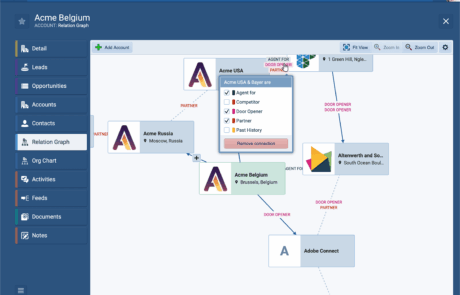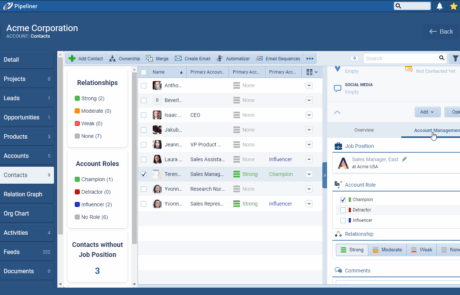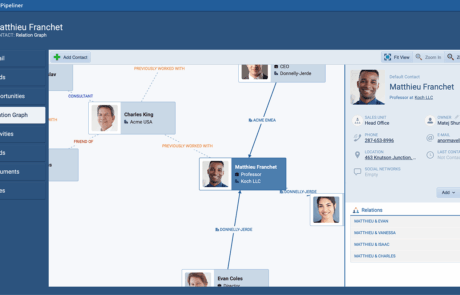In the complex, interconnected world of modern business, success isn’t just about managing individual accounts—it’s about understanding the ecosystem that surrounds them. Stop treating your key clients and prospects as isolated dataData Data is a set of quantitative and qualitative facts that can be used as reference or inputs for computations, analyses, descriptions, predictions, reasoning and planning. points. Pipeliner CRM’s revolutionary AccountAccount Account refers to a record of primary and background information about an individual or corporate customer, including contact data, preferred services, and transactions with your company. Relations feature maps the intricate, real-world dependencies between companies, transforming market insights into a competitive edge.
Visualize Complexity, Unlock Hidden RevenueRevenue Revenue is the amount of money a business generates during a specific period such as a year or a quarter; also called sales.
Your account data holds far more than just names and addresses. The heart of Accounts Relations is the Relation Graph—an intuitive, dynamic visualization that reveals the corporate connections you need to leverage.
This is where true strategic power lies. With the Relation Graph, you instantly cut through complexity to see who influences whom, identify potential shared risk, and pinpoint high-value “Door Openers” that leadLead Lead refers to a prospect or potential customer (who can be an individual or organization) that exhibits interest in your service or product; or any additional information about such entity. to warm introductions. You gain the deep context required to build more effective, targeted strategies that close deals faster and cement long-term loyalty.
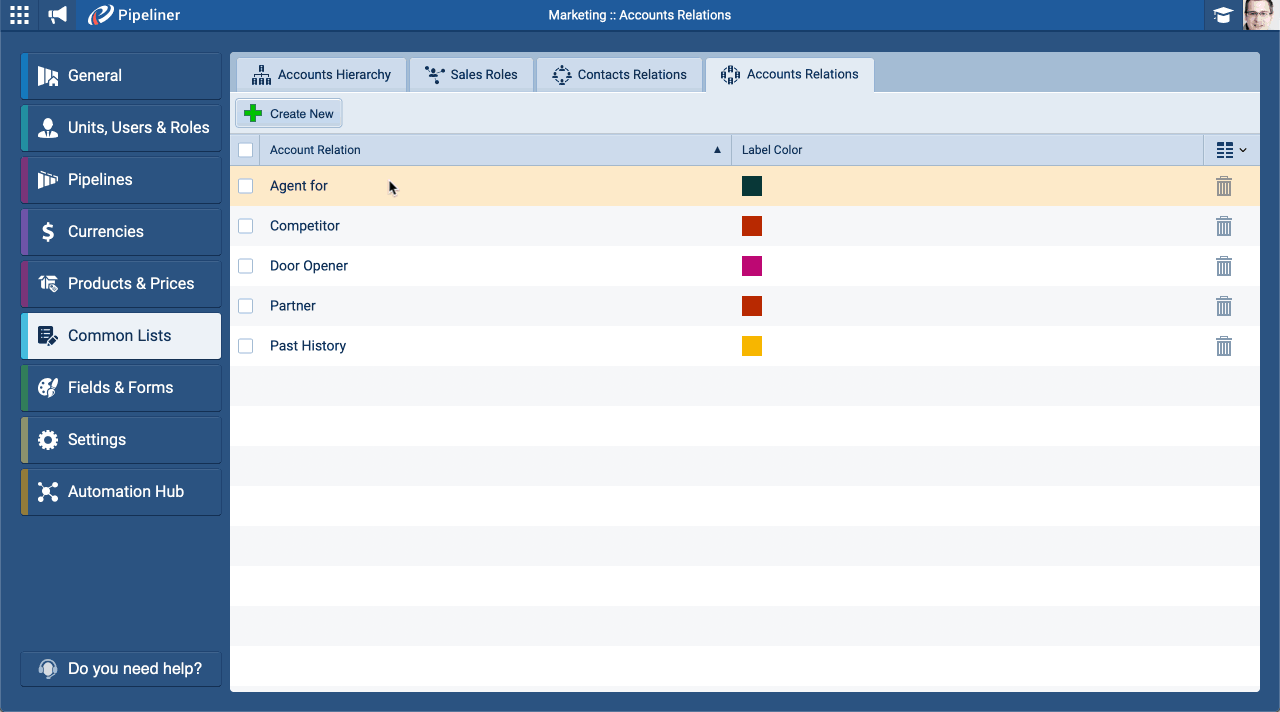
Built for Real-World, Strategic Advantage
Your unique business relationships demand flexibility. Pipeliner CRM doesn’t confine you to rigid categories; it lets you define any custom relationship type that aligns with your strategy. Imagine the power of tracking:
- Partners and Agents: Clearly see which companies co-sell with you or act as referralReferral Referral means the act, process, or technique of generating sales leads wherein a third party shares information about a new prospect. sources in new geographies.
- Preferred Suppliers: Understand vendor preferences within an account’s network to anticipate needs or target competition.
- Joint Ventures: Easily manage risk and reward across complex, shared initiatives.
By enabling this level of detail, you ensure that every strategic alliance and corporate dependency is documented and visible.
Unify Your Team and Maximize Account Growth
While Pipeliner CRM’s Buying Center excels at mapping people within an opportunity, Accounts Relations adds the essential company-level intelligence to the entire ecosystem. This powerful combination drives alignment across your revenue teams:
- Account Managers gain the critical foresight to identify cross-sell or up-sell opportunities by seeing immediate connections to sister companies or subsidiaries.
- Sales Teams navigate complex organizational structures by finding the shortest path to decision-makers through known corporate alliances.
- Customer SuccessCustomer Success Customer Success is a proactive mindset, function, department or strategy commonly adopted by B2B companies to optimize business with customers, reduce churn rate, drive profits and increase the predictability of recurring revenue. Managers ensure maximum clientClient A client is an entity who pays another entity for products purchased or services rendered. Also called a customer. retention by understanding the client’s broader network to secure long-term, mutually beneficial partnerships.
Pipeliner CRM Accounts Relations is the difference between managing transactions and mastering your market network.
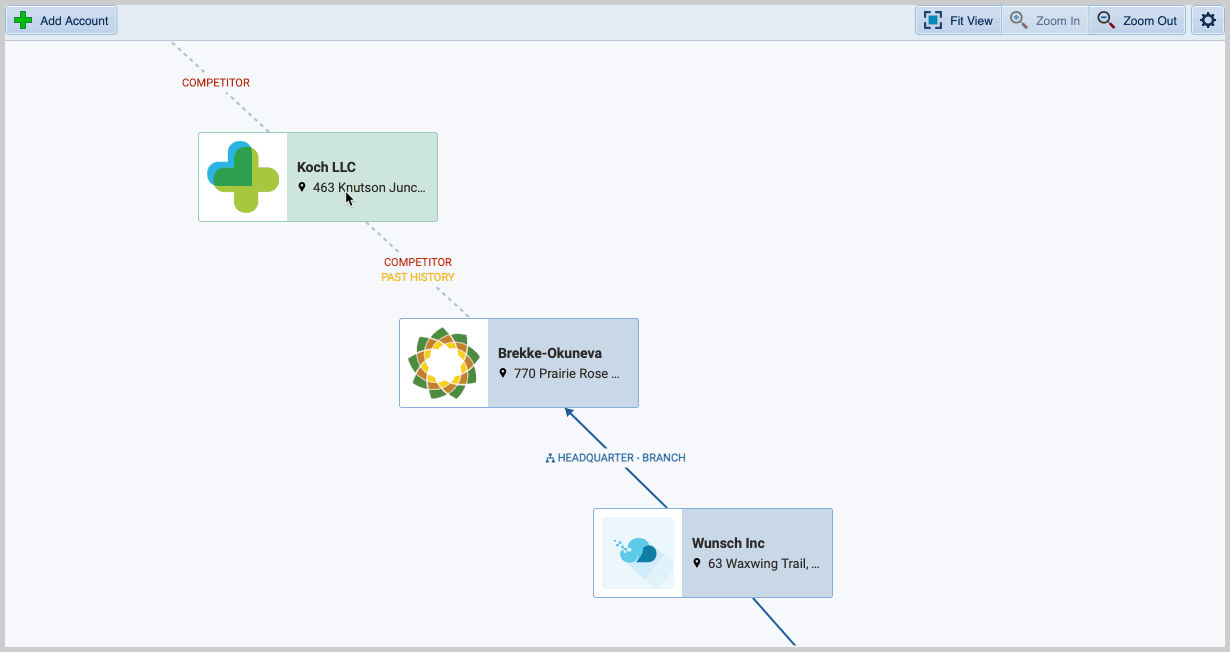
Accounts Relations: Frequently Asked Questions (FAQ)
Accounts Relations is a dynamic CRM feature that allows you to map and visualize the complex, real-world connections between different business accounts (companies) using the Relation Graph.
It is essential for B2BB2B B2B is an acronym for Business-to-Business, a model for selling, relationship-building, or engagement. sales because:
- Complexity: It simplifies understanding interconnected corporate structures (like subsidiaries, partners, or parent companies).
- Strategy: By leveraging alliances and dependencies between companies, Account Managers and Sales teams can identify strategic leverage points, anticipate market moves, and find the shortest path to decision-makers.
A standard Account Hierarchy typically only shows a formal, top-down structure (Parent Company $\rightarrow$ Subsidiary $\rightarrow$ Branch Office).
The Accounts Relation Graph is far more flexible and comprehensive. It maps any custom relationship you define, including:
- Strategic Alliances: “Preferred Supplier,” “Joint Venture,” or “Agent in Asia.”
- Influence Relationships: “Door Opener” or “Key Competitor.”
- This dynamic view lets you visualize connections that don’t fit a strict parent-child structure, giving you richer, actionable sales intelligence.
Yes, absolute customization is a key advantage. You are not limited to pre-set terms. You can easily define and add any relationship type that is relevant to your business strategy, such as “Technology Partner,” “Reseller,” or “Mutual Client.” This ensures your CRM accurately reflects your unique corporate ecosystem.
While the entire revenue team benefits from clear, shared intelligence, the feature is compelling for:
- Account Managers (AMs): To identify cross-sell, up-sell, and retention opportunities within related corporate entities.
- Customer Success Managers (CSMs): To understand the client’s broader business context and dependencies, strengthening long-term retention.
- Sales Teams: To uncover key corporate influencers and leverage existing partnerships to accelerate new opportunities.
They work together to provide a complete view of the account.
- The Buying Center focuses on individuals within a single Opportunity, mapping roles, influence, and alignment (e.g., Champion, Decision MakerDecision Maker Decision Maker in the context of sales, is a person who possesses the required expertise and authority in making purchase decisions.).
- Accounts Relations focuses on companies in the ecosystem, mapping the corporate connections between Accounts.
Together, they provide both the human intelligence (who to talk to within a deal) and the corporate intelligence (how the client’s company relates to others in the market).
Learn More About Pipeliner CRM
Take a no-obligation 14 day trial of Pipeliner CRM.
No credit card info required – just experience for yourself how it could impact your sales.

